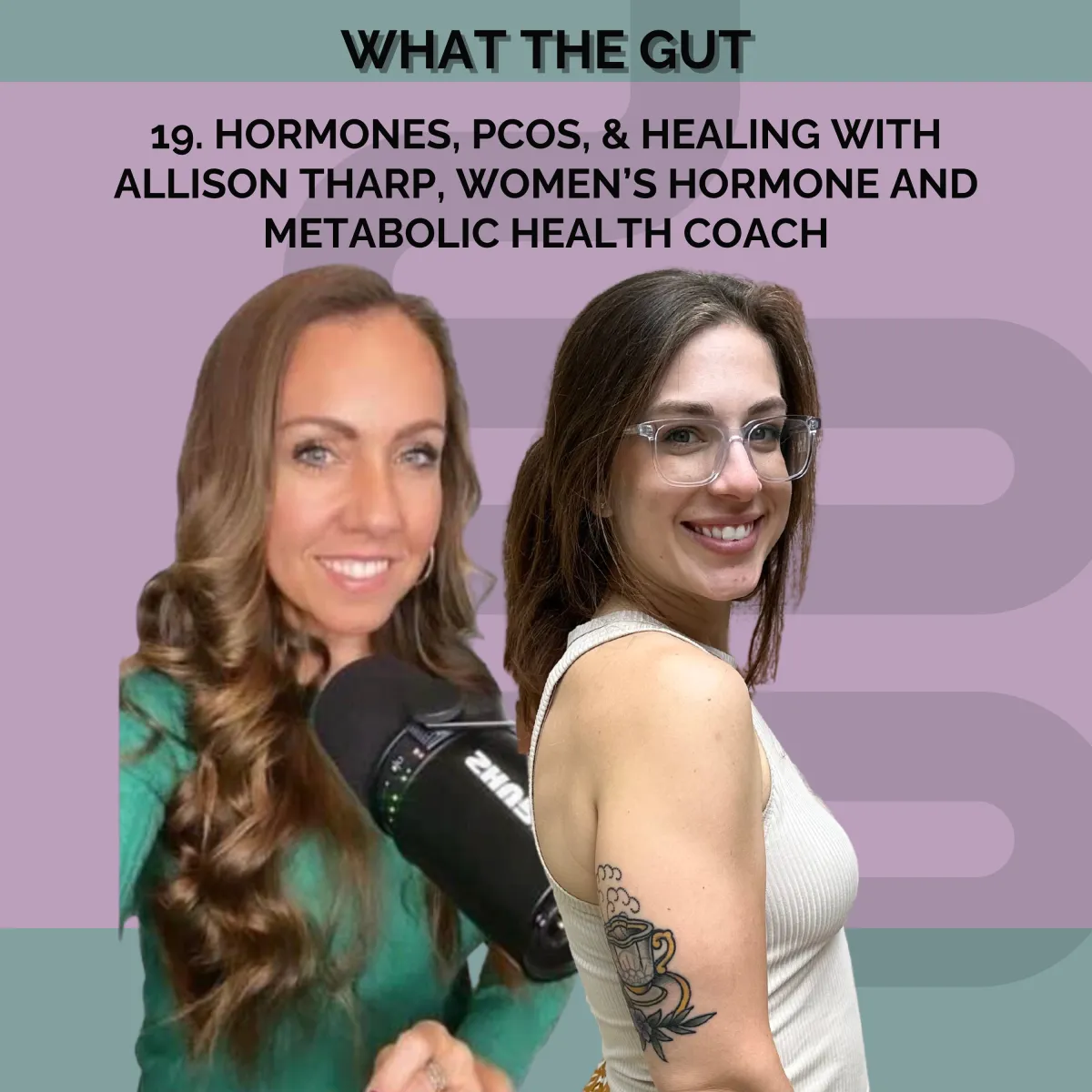
Ep. 19 | Hormones, PCOS, & Healing with Allison Tharp, Women’s Hormone and Metabolic Health Coach
Ep.19 | Hormones, PCOS, & Healing with Allison Tharp, Women’s Hormone and Metabolic Health Coach
Listen on:
Apple | Spotify | Other Platforms | Watch on YouTube
Have you ever wondered how holistic health and functional medicine could transform your life or are you tired of feeling trapped in an endless cycle of health challenges that seem to have no solution? This is an awesome episode featuring Allison Tharp, a women’s hormone and metabolic health coach where she shares her own health journey and sheds light on the benefits of functional medicine.
Personal Health Struggles
A perpetual exerciser and dieter from a young age, Allison was diagnosed with PCOS (Polycystic Ovarian Syndrome) at 16. Often misdiagnosed or misunderstood, PCOS manifests with symptoms like unsteady cycles, unexplained weight gain, mood disorders, and fertility issues. The common treatment then–and often now–involved prescribing birth control and bidding the patient return only when ready for conception. For Allison, and countless other women, this method did little to address the underlying hormonal disorder, causing her to grapple with her weight for most of her life. At 28 though, she experienced a breakthrough—she acknowledged the toll her lifestyle was taking on her health and decided to change.
From Recklessness to Recovery
Embracing a healthier lifestyle meant altering dietary habits, attitudes, and behaviors towards food and exercise. Initially, Allison adhered rigidly to a diet and exercise regimen without considering the unique requirements of the female body. A realization came though; women's bodies operate on longer hormonal cycles than men’s and need different supports during each phase of the menstrual cycle. Indiscriminate fasting and excessive workouts can unwittingly disrupt a woman's hormonal cycle and overall health. Allison advocates for a more balanced approach, where fasting and high-intensity workouts are performed during parts of the cycle when hormones are at their lowest levels.
Embracing Functional Medicine
Advocating for active participation in one’s health journey, Allison emphasizes how implementing a functional medicine approach can unveil the root causes of health issues and curate personalized healing strategies. She stresses that while conventional medicine (or 'sick care') focuses on managing symptoms, functional medicine includes lifestyle modification for comprehensive health improvement. Health modifications discussed involve nutritional guidance, supplemental support, stress control, and improving sleep hygiene, which when combined with functional lab testing, can give a holistic purview of a woman's health state. Allison says understanding the importance of ovulation, moderating activeness to align with hormonal shifts throughout the cycle, and practicing cycle-synced living can make a significant difference.
Image above from Dr. Brighten's website.
Detailed Phases of the Menstrual Cycle
Menstruation. During menstruation, your body sheds the endometrial lining and estrogen and progesterone are at their lowest point. This is your period, the most noticeable phase in your menstrual cycle because you’re bleeding.
Proliferative Phase. When your period ends and you begin to rebuild the uterine lining.
Follicular Phase. First day of your period until ovulation. Estrogen and FSH rise in preparation for ovulation.
Ovulation Phase. The release of an egg. LH and Estrogen spike, which triggers the release of the egg.
Luteal Phase. The luteal phase starts after ovulation and lasts through your next period. During the luteal phase, you produce higher levels of progesterone.
Secretory Phase. The secretory phase is when the uterus produces chemicals to prepare for the implantation of a fertilized egg.
Hormones of the Menstrual Cycle
The main hormones of the menstrual cycle include:
Follicle Stimulating Hormone (FSH)
Luteinizing Hormone (LH)
Estrogen
Testosterone
Progesterone
Each hormone rises and falls at different times in your cycle.
Follicle Stimulating Hormone (FSH)
Follicle Stimulating Hormone is a brain hormone that is secreted by the pituitary gland. FSH stimulates the ovaries to prepare for ovulation.
Luteinizing Hormone (LH)
Secreted by the pituitary gland, Luteinizing Hormone triggers the release of an egg during ovulation.
Estrogen
Estrogen is the predominant hormone in the follicular phase that encourages ovulation and the development of the endometrium.
Testosterone
You may think of testosterone as a male hormone, but women need a small amount. And when we don’t have it, we feel it. Testosterone is an androgen that supports immune health, libido, and is necessary for a healthy menstrual cycle.
Progesterone
Progesterone is the predominant hormone of the luteal phase that prepares the endometrial lining for ovulation.
Resources:
Connect with Allison Tharp:
Connect with Allison:
Instagram: @allison_and_wellness
Facebook: allisonandwellness
Website: www.allisonandwellness.com
